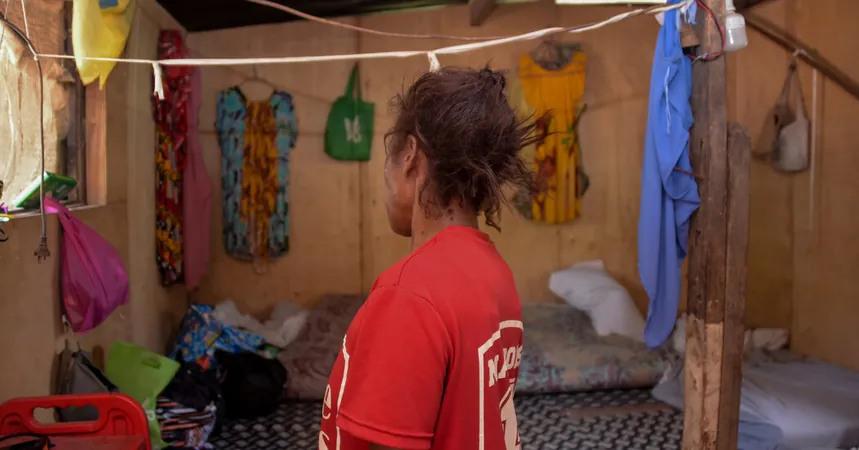
The Alarming Rise of Sorcery Accusations in Papua New Guinea
2024-11-24
Author: Ken Lee
The Alarming Rise of Sorcery Accusations in Papua New Guinea
In a shocking incident that highlights the growing urgency of sorcery-related violence in Papua New Guinea, armed men recently attacked a woman, Korai, in retaliation for the tragic death of a baby girl. The attackers claimed that Korai was responsible for the child's demise through sorcery, despite her pleading innocence and ignorance of what a sorcerer even is.
This harrowing event unfolded on the outskirts of Port Moresby, where Korai was brutally dragged from her home. Armed with bush knives, the attackers severely tortured her, breaking her hands and burning her with hot metal bars. It was only thanks to her son’s timely alert to the police that she survived the horrific ordeal. Korai, now traumatized and bearing visible scars from the attack, continues to fear for her safety, asking to be identified only by her first name.
Such incidents are disturbingly frequent in Papua New Guinea, where an enduring belief in sorcery and black magic spurs communities to find a scapegoat during times of tragedy. Experts, including Miranda Forsyth from the Australian National University, note that the violence linked to these accusations has reached alarming extremes. 'The violence is becoming more extreme. It’s a symptom of things being very, very wrong,' Forsyth stated.
Graphic accounts have emerged from the region, capturing horrifying scenes where women accused of sorcery are subjected to brutal beatings and torture. In one disturbing image, victims sit blindfolded above flames, echoing ancient practices reminiscent of witch hunts. The infrastructure for documenting such violence is severely lacking due to the country’s diverse geography—hundreds of languages are spoken, and remote communities often remain isolated from legal interventions.
Adding to the gravity of the situation, Sister Lorena, a Swiss nun dedicated to humanitarian efforts in Papua New Guinea, recently revealed to Pope Francis that she has saved over 200 individuals from malicious sorcery accusations. The plight she described included victims tortured to the brink of death, illustrating a crisis that has permeated both urban and rural settings.
The extent of the problem was quantitatively underlined by researchers, who documented 1,039 accusations with 1,553 victims across four provinces from 2016 to 2020. Of those, nearly 300 people suffered injuries or lost their lives. The fears and suspicion surrounding sorcery are not limited to Papua New Guinea; similar phenomena have been recorded across Africa and Asia, showcasing a broader pattern of superstition leading to violence.
In these communities, tragic events often lead to witch hunts driven by a figure known as the 'glass man'—someone who interprets the smoke patterns from burned bamboo to identify supposed sorcerers, further perpetuating the cycle of accusation and violence.
Interestingly, despite Papua New Guinea’s strong Christian population, certain religious leaders inadvertently fuel these superstitions rather than dispelling them. Many community members, like elementary school teacher Carmel Piknisu, express hopes that leaders such as Pope Francis can help illuminate the path towards healing and understanding, urging a collective repudiation of violent beliefs.
'All the sorcerers must repent and stop,' she emphasized, warning of the dangerous practices that those accused of witchcraft may ostensibly employ, particularly poison.
To intervene, the United Nations has launched campaigns to counteract the misconceptions linking sorcery to diseases, asserting, for instance, that 'TB is not caused by sorcery.' Despite a legal shift in 2013 that made witchcraft suspicions invalid as a court defense, prosecutions of self-appointed sorcery hunters remain exceedingly rare, leaving many victims and their families to endure a life of stigma and fear.
Shelters across the country are filled with survivors of these brutal attacks, along with their families who also bear the harsh consequences of sorcery accusations. Rose, a 42-year-old mother, shared her own heartbreaking experience after her husband was accused and attacked for the alleged death of a child in their community. 'They will still point fingers at us, and if they see our children,' she lamented, reflecting the persistent stigma that isolates families marked by such accusations.
As Papua New Guinea grapples with these troubling issues, it becomes increasingly imperative for both local communities and international bodies to collaborate in combating the violence tied to sorcery beliefs. The lives at stake demand urgent attention to foster awareness and promote a culture of safety and healing, rather than oppression and fear. The question remains: when will this nightmare end?




 Brasil (PT)
Brasil (PT)
 Canada (EN)
Canada (EN)
 Chile (ES)
Chile (ES)
 España (ES)
España (ES)
 France (FR)
France (FR)
 Hong Kong (EN)
Hong Kong (EN)
 Italia (IT)
Italia (IT)
 日本 (JA)
日本 (JA)
 Magyarország (HU)
Magyarország (HU)
 Norge (NO)
Norge (NO)
 Polska (PL)
Polska (PL)
 Schweiz (DE)
Schweiz (DE)
 Singapore (EN)
Singapore (EN)
 Sverige (SV)
Sverige (SV)
 Suomi (FI)
Suomi (FI)
 Türkiye (TR)
Türkiye (TR)